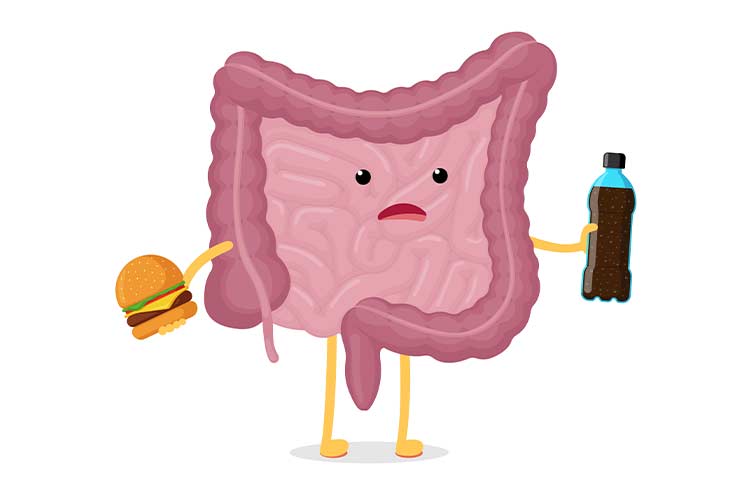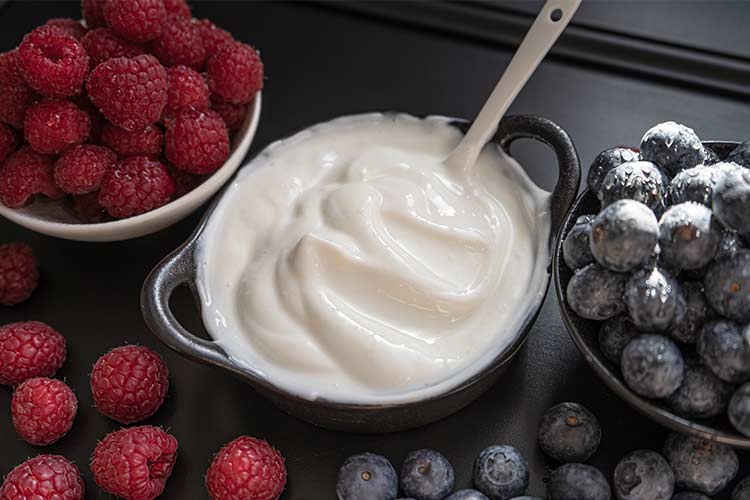
Lower Your Risk of Colorectal Cancer Through Diet
February 15, 2023
While there’s no one type of diet that can eliminate your risk of developing colorectal cancer, some studies suggest that consuming certain foods and drinks and avoiding others might aid in prevention by reducing inflammation. Chronic inflammation has been shown to be closely linked to incidences of cancer because it can cause DNA damage.
What to Eat and Drink
- Foods rich in fiber – Consuming whole grains, nuts, seeds, and legumes may help lower your risk. Brown rice and rice bran, in particular, may help reduce colon polyp formation and inflammation. Try to build up to eating 30 grams of fiber per day. Fiber tends to add bulk to the digestive system, which may help prevent colorectal cancer by shortening the amount of time waste, including carcinogens, travels through the colon.
- Fresh fruits and vegetables – Not only is fresh produce a great source of fiber, but it can also help lower blood sugar and cholesterol. Spinach, for example, is high in magnesium, which may help prevent cancer-causing polyps. As for fruits, the best choices are low-sugar varieties, such as peaches, strawberries, grapefruit, oranges, and melons.
- Lean meats – The protein in lean cuts of chicken, turkey, salmon, and pork can help cells repair themselves. Be sure to trim off excess fat during preparation.
- Dairy – Minimally processed dairy, such as plain Greek yogurt, contains probiotics that help balance the good and bad bacteria in the gut and keep it healthy.
- Water – Choosing to drink water over other beverages is beneficial for many reasons, including aiding in digestion and helping to prevent constipation.
What to Avoid
- Heavily processed foods – Studies have shown that ultra-processed foods raise the risk of colorectal cancer in men, possibly due to the foods containing sugars, oils, and fats and being low in nutrients that can help prevent cancer.
- Red meat and processed meats – Meats such as salami, bacon, and hotdogs are processed with preservatives, including nitrates and sulfites, that may contribute to colorectal cancer. Also, red meat is typically prepared by grilling or pan-frying at high temperatures, which can release cancer-promoting chemicals. For this reason, it’s recommended that you limit red meat consumption to 18 ounces per week and eliminate processed meats from your diet.
- Alcohol – Excessive alcohol consumption can contribute to cancer in several ways. One way that may be a factor in the development of colorectal cancer is the fact that ethanol in alcohol breaks down to acetaldehyde. This known carcinogen damages DNA and prevents cells from being repaired, which can assist in the growth of cancerous cells.
- Sugary drinks – Refined sugar in general may cause or increase inflammation in the body, and sugary beverages have been associated with colorectal cancer. Researchers are currently studying whether sugary drinks may also be contributing to the increase in colorectal cancer among people younger than 50. Fructose and glucose in the colon and blood may also cause existing tumors in the colon to grow.

You can help reduce your risk of developing colorectal cancer by making smart changes to your diet, but your best defense is keeping up with colorectal screenings. If you’re 45 or older, or if you have a higher-than-average risk of developing cancer, talk to your doctor about scheduling a potentially life-saving colonoscopy.









